Contact us today:
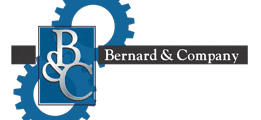
(847) 934-4500
tdaro@bernardandcompany.com

Contact us today:
(847) 934-4500
tdaro@bernardandcompany.com
Visit Rattunde at FABTECH Booth S-4179
UPDATE! See the video of Rattunde at FabTech HERE.
For over 20 years Rattunde has been designing and building innovative solutions for tube and bar sawing and post cutoff value added processes. From mill length tube and bar to finished product; cleaned, inspected and neatly stacked, Rattunde’s fully automatic ACS Production Systems get the job done quickly, precisely and at lowest cost per part. Whether you are looking to simply recut mill length tube and bar, recut and brush, recut and end finish or recut and machine complex features, including threading, there is a Rattunde ACS Production System suited to your needs. Do you need 100% inspection, washing and drying or maybe automatic stacking of your finished parts? Rattunde’s ACS Production Systems can be fully integrated with any number of Rattunde’s inspection, washing and drying or automatic stacking systems.
Recent News: Rattunde Building New Facility to Manufacture in America
For more information, please contact:
RATTUNDE CORPORATION
4980 Kendrick Street SE
Grand Rapids, Michigan 49512
Phone: 616-940-3340
Fax: 616-940-2771
Web: www.rattunde-corp.com
Email: company@rattunde-corp.com
Attention: Richard Stadler or Alec Banish
North Carolina shop now utilizing additive manufacturing to assist in the Engineer & Build of Hydraulic Workholding and CNC Production Parts
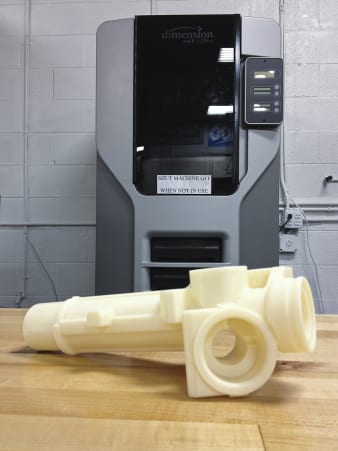
3D printing, also known as additive manufacturing, has been incorporated into the engineer and build phases of workholding devices and other products at James Tool.
Morganton, NC – James Tool designs and manufactures a wide variety of hydraulic workholding devices, used in aerospace, automotive and other high-precision industries. Because of the continuous custom work done here, it is imperative that the company keep abreast of all technological developments in the design and production of its products. To that end, James Tool has recently installed 3D printing, a form of additive manufacturing, to its Engineer & Build Hydraulic Workholding Division at the company. James Tool also offers CNC Production Machining and Non-Production Precision Machining to its customers, who comprise major OEMs and suppliers to aerospace, automotive, off-highway, energy, nuclear and transportation industries.
According to Jeff Toner, president of James Tool, “We are always watching trends in the manufacturing industry and we started seeing 3D printing make an impact, some years ago. We waited until the technology had evolved and become more affordable before making our investment.” The first machine was purchased recently and is currently used to support the company’s workholding division as well as help in the estimating of CNC machining opportunities.
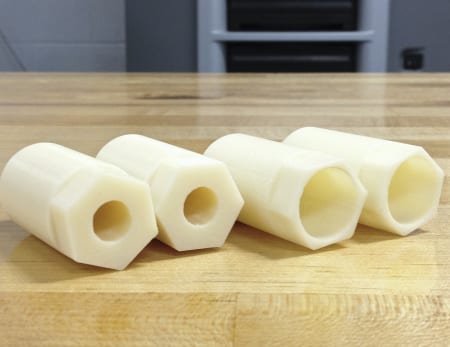
The process involves the incremental build-up of metal material to produce a working model, used for production evaluation, sales presentations and possible design modifications.
3D printing is a form of additive manufacturing, in which material is built-up, one layer at a time, to create a 3D solid working model from a CAD file. James Tool engineers believe this technology is substantially changing the way the company can serve its customers. It is referenced as additive manufacturing to distinguish it from the subtractive process of traditional machining, in which metal chips are removed from the surface of a blank workpiece.
James Tool assigned a team to research the current 3D printing technology in great detail, before making their purchase decision to acquire a Stratasys Dimension 1200ES machine. This machine has the capability of running parts with a 10” x 10” x 12” envelope in an ABS plastic substrate.
As Toner explains, “We were up and running parts within two hours, after the installation and set-up. This included the initial calibration on the machine and training from the local technician. The 3D printing image gives our engineers a cleaner concept and enables a much more robust design process, as we can see clamping tabs, locating pins and the entire work envelope more clearly. This results in an easy-to-use, cost effective tool, plus we have significantly shorter times needed for quote and order-to-first part sequencing.” Because James Tool had run 3D imaging in its CAD designs for over 15 years, the transition to 3D printing was practically seamless, he added.
James Tool Vice President and General Manager Tim King further notes that, while the interaction between James Tool and its customers has not changed substantially, it is quite helpful to have an actual part generated through the 3D printing process, before engineering and quoting begin. He sees this new capability as a positive extension of the existing customer service process at his company. The first customer orders to benefit from the use this system at James Tool have already been secured and the results have exceeded expectations, King said. “When you can go into a meeting with an actual part in hand, it can help in many ways. The customer and we can often see desirable changes that might make the component function more effectively, be easier to machine, or both.”
Peering into the crystal ball for a moment, Jeff Toner also notes that he sees additive manufacturing as a true “game changer” for the machining world. “The day is not far off when subtractive machining will be obsolete and actual production parts will be printed rather than machined using conventional methods, on a very large number of the jobs we handle.” He plans that his company will soon become a regional leader in the additive and other advanced technology arenas. “The future of 3D manufacturing is really limitless, as anybody can now order a desktop 3D printer for their business or home office and have a 3D prototype part in less than a few hours, once they master the system. I expect this technology will revolutionize manufacturing and create a new breed of entrepreneurs in our industry and others.”
Quantifying the impact of this new technology at James Tool, Jeff Toner concludes that 3D printing has already reduced engineering and quoting time substantially for workholding fixtures and CNC production jobs at his company. James Tool runs roughly an equivalent amount of work in production and one-off or short run jobs.
In its ongoing effort to maintain a quality workforce, the company partners with Kennametal on tooling advancements, as well as maintaining a full training facility on its Morganton, North Carolina campus, which has recently expanded to house more machining, finishing, quality lab and large work piece handling equipment. James Tool actively trains many of its employees in cross-functional machining operations, proven out by the many work cells the company operates in its various shop departments. Jeff Toner and Tim King both believe this strategy makes the company more flexible and capable for its customers.
For more information on this story, please contact:
James Tool Machine & Engineering, Inc.
130 Reep Drive
Morganton, NC 28655
Phone: 828-584-8722
Fax: 828-584-8779
Web: www.jamestool.com
Email: sales@jamestool.com
Attention: Kevin Moses or Jeff Toner
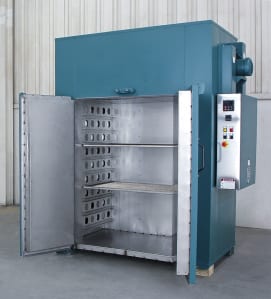
This Grieve cabinet oven features 6” thick insulated walls, top-mounted heat chamber, plus an aluminized steel interior and exterior.
Controls onboard No. 1025 include a digital indicating temperature controller, SCR power controller, manual reset excess temperature controller with separate contactors and a recirculating blower airflow safety switch.
For more information, please contact:
THE GRIEVE CORPORATION
500 Hart Road
Round Lake, IL 60073-2835
Phone: (847) 546-8225
Fax: (847) 546-9210
Web: www.grievecorp.com
Email: sales@grievecorp.com
Attention: Frank Calabrese
Major machine tool company in Detroit supporting


Speaking at Oakland Community College on September 3, Senator Stabenow said her new bill would provide a federal match equal to state training reimbursements, so that the repayment to the colleges would occur more quickly, plus there would be an increase in the number of eligible companies and workers participating.

Senator Stabenow further remarked, “This program is a partnership between businesses and the community colleges, reaching out to workers. And it’s a way for the federal government to recognize that new job skills training – to match the jobs now available – is a top priority for moving the economy forward.”
The New Jobs Training Program in Michigan was begun in 2008 and last year trained nearly 10,000 workers in partnership with 44 companies, generating $76 million in additional wages for the Michigan labor force.
For more information on this announcement, please contact:
Kristal Kilgore
EMAG LLC
38800 Grand River Avenue
Farmington Hills, MI 48335
Tel: (248) 875-0313
Fax: (248) 477-7784
E-mail: kkilgore@emag.com
Web: www.emag.com
Major machine tool company supporting next generation of industrial mechatronics technicians

Students Rebekka Neumann and Matthew Combs study toward their degree as a Mechatronics Technicians at Oakland County Community College and Henry Ford Community College, while working at manufacturing and machinery companies such as EMAG, under the MAT2 program
Farmington Hills, MI – EMAG L.L.C. is a major machine tool supplier to the automotive, off-highway and energy sectors of North American industry and has a very special connection it chooses to foster, thinking into the future of its industry. Based in the Detroit area, EMAG is currently participating in the Michigan Advanced Technician Training (MAT2) program with Oakland County Community College in Southfield, MI and Henry Ford Community College in Dearborn, MI. This program offers high-school graduates a career in machine Mechatronics, the discipline that incorporates electrical, electronic and mechanical study, providing all graduates an Advanced Associate’s Degree through a multi-year program completely funded by employers such as EMAG, who offers the graduates career opportunities as well. The program began for EMAG in the Fall, 2013 school semester.
During three years of schooling, students have their tuition, all fees and even a laptop provided to them by EMAG. They take a combined classroom/work curriculum, with paid employment at EMAG during the last two years of their schooling.
Mechatronics technicians support the critical machining world in industry, as they work with engineers, modify machines, maintain all components, troubleshoot and provide service on all related equipment for advanced manufacturing companies.
MAT2 is officially sponsored by Orbitak International and a number of Detroit-area manufacturers and machinery companies, including EMAG.
EMAG L.L.C. CEO Peter Loetzner comments, “This program is very special for me, as I studied the then-new area of Mechatronics in school myself. I have always believed it is necessary that we help educate and train the next generation of engineering, operator and maintenance personnel. We at EMAG are very proud to participate in this important program for Michigan and our home Detroit area, in particular.”
For more information on this announcement, please contact:
Kristal Kilgore
EMAG LLC
38800 Grand River Avenue
Farmington Hills, MI 48335
Tel: (248) 875-0313
Fax: (248) 477-7784
E-mail: kkilgore@emag.com
Web: www.emag.com
Kristal Kilgore
EMAG LLC
38800 Grand River Avenue
Farmington Hills, MI 48335
Tel: (248) 875-0313
Fax: (248) 477-7784
E-mail: kkilgore@emag.com
Web: www.emag.com
15.3 million automobiles will be sold in the USA in 2013 alone. Even higher sales figures are anticipated for 2014. Manufacturers primarily want to meet the increased demand, including for automobiles with alternative drive systems such as hybrid drives and electric motors, by increasing their productivity. With its successful machine-tool concepts, EMAG has frequently demonstrated that productivity can be boosted above all by using state-of-the-art machine tools and the company wants to continue to do this on the market in the USA, a market that has been important traditionally. The EMAG branch in Farmington Hills in Michigan that has been successful for many years now offers an absolute guarantee of EMAG reliability and presence in America. This EMAG plant supplies a wide variety of customers throughout North America and thus makes a small but important contribution to boosting productivity in the USA. Let us convince you of the quality of our machines and the possibility of boosting production at WESTEC which is to be held in Los Angeles between October 15 and 17. You will find EMAG in the Convention Center at Stand 2820.
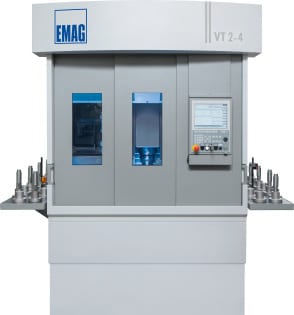
Shafts are central components in an automobile’s powertrain. Thus, boosting productivity for this manufacturing process also has a clear effect on overall productivity. The vertical, 4-axis pick-up-turning machine VT 2-4 allows machining of shafts with a length of up to 400 mm and a diameter of up to 100 mm. Our consistent demand for maximum productivity is demonstrated by integration of the automation solution whereby the machine loads itself with raw parts using workpiece grippers. It takes approximately 6 seconds to change the workpieces and this thus leads to short idle times and, consequently, lower component costs. The actual turning process for which two tool turrets, each with twelve tool positions, are available (fitted with turning tools or driven tools) is performed at a speed of 6,000 rpm in extremely short cycles. The integrated automation system, combined with the compact vertical machine structure, allows you to configure production lines with a very small footprint. The VT 2-4 vertical turning machine is consequently ideally suited to integrating shaft production in existing manufacturing systems.
VL 2 – pick-up turning machine for small chuck parts
Besides the shafts, it is mainly chuck shafts which are involved in the production of automobiles. The fact that small chuck components need to be machined to an increasing extent in order to implement more compact and, thus, more lightweight parts is primarily due to the further developments in the field of boosting energy efficiency.
The VL 2 is designed to machine chuck parts with a maximum diameter of up to 100 mm and a length up to 150 mm. At the same time, the VL 2 offers a whole range of clever design details and hi-tech components which allow high productivity. These include the pick-up spindle which loads itself with raw parts from the integrated conveyor and the tool turret equipped with 12 tool positions which allows diverse machining scenarios. To date, there has not been such a compact manufacturing solution for machining hard or soft chuck parts. The machine concept is supplemented by a machine base made of MINERALIT® polymer concrete that ensures high strength and excellent vibration damping.
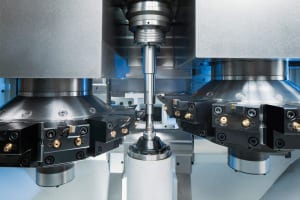
EMAG LLC
38800 Grand River Avenue
Farmington Hills, MI 48335
Tel: (248) 875-0313
Fax: (248) 477-7784
E-mail: info@usa.emag.com
Web: www.emag.com
Attention: Peter Loetzner
Continue readingAnn Arbor, Michigan – GMTA (German Machine Tools of America) represents various top-quality German metalworking machine builders, including Profilator, Pittler, Praewema and WMZ. These machines are sold to the North American market by GMTA primarily for gear and spline production, as well as other power transmission applications. The company’s target markets include automotive, off-highway, OCTG and other heavy equipment manufacturing. Machines are provided for gear honing, gear grinding, Scudding®, polygon milling, turning, gear tooth pointing and multiple machining operations.
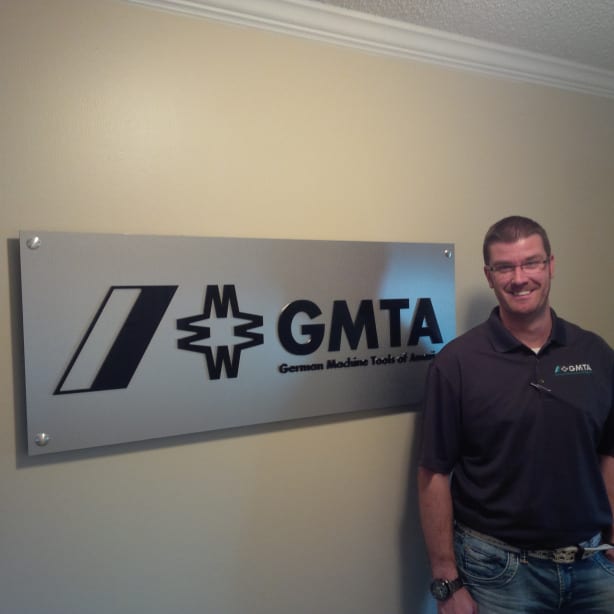
Maik Schminke is named Manager of Controls Engineering & Programming
In the news…
-Effective October 1, Maik Schminke was named Manager of Controls Engineering & Programming at the Ann Arbor facility of GMTA. According to GMTA President Walter Friedrich, “This appointment fills our need to provide and support customers with machine tool controls, SPS, PLC and CNC programming.” Schminke has worked for the past 12 years at the German partner to GMTA, Diskus, part of the large DVS Group in Germany). Prior to Diskus, he worked at Pittler, another GMTA partner company in Germany and also a DVS Group company. Schminke completed his apprenticeship program, while at Pittler.
-EMO was a BIG success for all the partners to GMTA. Walter Friedrich and Scott Knoy from GMTA attended the show and saw many North American customers and friends, then visited their partner companies. As it was Oktoberfest in Germany, Walter and Scott also sampled several local brews. A good time was had by all!
-Plans are underway to have an open house at the newly renovated GMTA facility in Ann Arbor, Michigan. This expanded facility now houses parts and service, a full machine demo center, sales and corporate management for this growing machine tool company. GMTA is the exclusive North American distributor for leading German machine tool builders and tooling suppliers, concentrated in the gear and spline production machine markets.
For more information on this announcement, please contact:
GMTA (German Machine Tools of America)
4630 Freedom Drive
Ann Arbor, MI 48108
Phone: 734-973-7800
Fax: 734-973-3053
Web: www.gmtamerica.com
Email: scott@gmtamerica.com
Attention: Scott Knoy, VP
Connect with GMTA online:
Visit us
TD Convention Center, Booth 701
Forecasted growth rates of 6.3% in sales of automobiles in the USA clearly demonstrate one thing: that the USA is and will remain one of the most important trading partners for Germany and German industry. The USA is traditionally an important market for EMAG, a leading machine tool builder in Germany. This is emphasized by the fact that EMAG has been present in Farmington Hills, Michigan, for many years now. Thanks to the deep roots that EMAG has in the USA, it is not only an important employer in the region near the “Motor City” of Detroit, but it is also a reliable business partner for numerous companies throughout North America. See the quality and reliability of our products for yourself at this year’s South-Tec show in Greenville, South Carolina. EMAG will showcase its machines in the TD Convention Center at Stand 701 at the trade fair to be held between October 29 and 31, 2013.
VL 2-P – productivity thanks to pendulum technology
When the aim is to shorten idle times, there are very few machines which can rival the EMAG VL 2-P. Workpieces up to 100 mm in diameter can be machined on the VL 2-P with unbeatably short cycle times. While there is a pause on other machines to allow the workpiece to be changed, the next workpiece is directly ready to machine on the VL 2-P. The key is that 2 spindles are used and these load themselves alternately while the tool turret swings between the machining positions. When machining is completed on one spindle, the tool slide moves to the second spindle to start a new machining process. Loading and unloading of the spindles which now occur in parallel with machining are virtually eliminated from the machining process and reduce idle times to an absolute minimum.
VT 2-4 – top-quality shaft machining
The vertical, 4-axis pick-up-turning machine VT 2-4 allows machining of shafts with a length of up to 400 mm and a diameter of up to 100 mm. Our consistent demand for maximum productivity is demonstrated by integration of the automation solution whereby the machine loads itself with raw parts using workpiece grippers. It takes approximately 6 seconds to change the workpieces and this thus leads to short idle times and, consequently, lower component costs. The actual turning process for which two tool turrets, each with eleven tool positions, are available (fitted with turning tools or driven tools) is performed at a speed of 6,000 rpm in extremely short cycles.
VL 2 – pick-up turning machine for small chuck parts
The VL 2 vertical pick-up turning machine is just the right choice for machining chuck parts with a maximum diameter of up to 100 mm and a length of up to 150 mm. At the same time, the VL 2 offers a whole range of clever design details and hi-tech components. These include the pick-up spindle which loads itself with raw parts from the integrated conveyor belt and the tool turret equipped with 12 tool positions which allows diverse machining scenarios. The machine body made of MINERALIT® polymer concrete ensures high strength and excellent vibration damping which is indispensable particularly when machining small chuck components.
VL 5i – flexible and efficient
Be it small or large series production, the EMAG VL 5i is the ideal manufacturing solution for turned parts up to 250 mm. The VL 5i is an interesting manufacturing solution above all for small- and medium-sized component producers, thanks to its excellent characteristics (e.g. short retooling times and fast programming). An automation system functioning on the basis of the drag-frame principle is integrated to round off the equipment features. This automation system, combined with the pick-up technology from EMAG, is the basis for the high productivity of the VL 5i. The workpieces are conveyed to the inside of the machine via the revolving automation system. The pick-up spindle loads itself there and it also deposits the finished workpiece back on the conveyor after machining. The advantages are obvious: the revolving automation system allows simple and very reliable loading and unloading of the parts, while the self-loading spindle ensures maximum machining reliability since clamping errors are virtually completely eliminated.
For more information on this announcement, please contact:
EMAG LLC
38800 Grand River Avenue
Farmington Hills, MI 48335
Tel: (248) 875-0313
Fax: (248) 477-7784
E-mail: info@usa.emag.com
Web: www.emag.com
Attention: Peter Loetzner
Remarkable U.S.-only engineered and equipped foundry praised by New Hampshire Governor and Franklin, NH Mayor for technological initiative and for creating local jobs
SCHAUMBURG, IL — Watts Water Technologies has begun operation of a new lead-free foundry in Franklin, NH that reflects the company’s commitment to proactively meet the requirements of the “Reduction of Lead in Drinking Water Act,” which goes into effect in January 2014 and establishes new limits on the lead content in every pipe, fixture, and fitting used to convey water for human consumption. Watts’ new WEFCO 2 foundry produces lead-free products exclusively, including lead-free versions of products the company produces at its WEFCO 1 facility (which is also located in Franklin, NH), as well as other products. Opening ceremonies were highlighted by comments from New Hampshire Governor Maggie Hassan and Franklin, NH Mayor Kenneth Merrifield.
Governor Hassan commended Watts for the types of products it produces at the new WEFCO 2 foundry, as “contributing to public health and safety, and for the company’s educational efforts around the Lead Free initiative.” She complimented the Franklin workforce, noting that, “The work effort here is extraordinary,” adding that the company is “emblematic of the ingenuity found across the Granite State.” Mayor Merrifield noted how rare it is to have a manufacturing facility that lasts 50 years, and how quickly the new foundry came into being. He referred to meeting this development challenge as a “remarkable accomplishment” and added “Congratulations, to an absolutely fabulous company.”
The new WEFCO 2 foundry expands and diversifies the production capacity of Watts’ WEFCO 1 foundry, which opened in April 1977, has undergone 16 updates, and produces products for many Watts brands. Based on its decades-long history of working with the WEFCO 1 foundry Hunter Foundry Machinery Corporation has kept pace with these expansions and updates.
“This is a great day for our company and its employees, our industry, and the Franklin community,” said Watts Water Technologies CEO and President David Coghlan at the June 21st ribbon-cutting ceremony of WEFCO 2 30,000-square foot state-of-the-art foundry. Coghlan stated the Watts WEFCO 2 foundry “will enable us to be the ‘safe choice’ for Lead Free products, since we can eliminate the possibility of cross contamination of materials. It will also enable us to provide efficient and timely availability of products.”
Former President and CEO, and Watts Water Director Emeritus, Tim Horne observed, “This significantly advanced foundry is the latest example of our commitment to the State of New Hampshire, and the city of Franklin.” Part of Watts’ strategy in this industry-leading facility are two XL2024 molding machines that feed onto a common HV-20 24 + 24 x 3 turntable mold handling systems, all produced by Hunter Foundry Machinery Corporation in Schaumburg, IL.
HUNTER’S ROLE
Since its inception in 1977, the WEFCO 1 foundry used a full range of Hunter mold making and mold handling machinery. Originally, Hunter’s HMP-10 molding machines were installed on a Hunter HMH-210 mold handler alongside two Hunter HMP-20 machines that were installed on a Hunter HMH-220 mold handler. Hunter later addressed challenges in the older section of the foundry, including the need to increase pouring speeds, by replacing its older machines with Hunter’s C-series products. In 1999 these Hunter HMP-10C machines were replaced with Hunter’s HMP-10H mold making machines.
For the new WEFCO 2 foundry, Hunter integrated an Inductotherm Auto-Pour unit fed by two Hunter XL2024 molding machines into common Hunter HV-20 24 + 24 x 3 turntable mold handling systems through use of a proprietary mold-tracking program. Hunter’s direct interface controller communicates computer-based pattern data with the correct pouring profile to an Inductotherm Auto-Pour furnace.
In addition to this 35-year working history, according to New Hampshire Operations Engineering Manager Mike Geldermann there were several reasons why Hunter Foundry Machinery Corporation was the molding machine and mold handling system provider of choice for the new foundry. “Hunter was the only single-source mold handling and mold making interface,” he states. “Their equipment was directly interchangeable with our current pattern plate setup and tooling, and provides us with improved cope-and-drag alignment to eliminate mold shift,” Geldermann says. Additionally, notes Geldermann, “Hunter’s systems were highly cost competitive when compared with other options,” he says, adding that Hunter’s familiarity with maintenance and upkeep of WEFCO 1 foundry machines was a key factor in their selection for the new WEFCO 2 production line.
For a video on this installation, please visit http://youtu.be/1d8475iM9Fo
For more information on the products in this story, please contact:
HUNTER AUTOMATED MACHINERY CORPORATION
2222 Hammond Drive Schaumburg, IL 60196
Phone: (847) 397-5110
Fax: (847) 397-8254
Email: info@hunterfoundry.com
Web: www.hunterfoundry.com
Connect with Hunter Foundry online:
—
ABOUT WATTS WATER TECHNOLOGIES, INC.
Watts Water Technologies, Inc., through its subsidiaries, is a world leader in the manufacture of innovative products to control the efficiency, safety, and quality of water within residential, commercial, and institutional applications. Its expertise in a wide variety of water technologies enables it to be a comprehensive supplier to the water industry. For more information, visit www.wattswater.com.
ABOUT HUNTER
Hunter Foundry Machinery Corporation was established in 1964 as Hunter Automated Machinery Corporation with the invention of the world’s first gravity-filled automated matchplate molding machine. This began the company’s history of innovation and launched the foundry industry into a new industrial revolution. Pioneered by William “Al” Hunter in his home garage, the original HMP-10 machine streamlined the laborious metal casting process by offering foundries unimagined new capabilities by producing as many molds in one hour as most had previously been produced in an entire day. As industry demands grew, Hunter responded with advanced solutions such as automated mold handling equipment and coresetters.
Now in its 50th year, Hunter Foundry Machinery Corporation’s inventions have earned nearly 150 U.S. and international patents. Hunter has produced more than 1,800 molding machines and mold handling systems for customers around the world. The company’s global reach extends from offices in the U.S., Brazil, China, India and Italy through North American, South American and Asia-Pacific manufacturing sites. Hunter’s sales and technical support is underscored by its $12 million parts inventory, established to maintain each machine’s original production capability across the worldwide foundry market.
Continue readingMajor German supplier of finished length tube and solid bar processing equipment to open new 30,000 square-foot facility in Grand Rapids area for tooling and component manufacturing; plans in place to expand for full machine builds

New Rattunde facility underway in Caledonia Township, Michigan, near Grand Rapids, due to open in April, 2014.
Rattunde Corporation, a German-based manufacturer of finished length tube and solid bar production systems, has been operating in the North American market for over seven years. The company’s success during that time has resulted in today’s announcement by Rattunde Corporation President Richard Stadler of plans to build a 30,000 square-foot facility near the company’s current location in Grand Rapids, Michigan. 14 acres of land have been purchased by the company in nearby Caledonia Township and work has begun on the new facility, scheduled to open in April, 2014.
The plant will continue to house the North American sales and service operations and will allow for expanded spare parts inventory and manufacturing operations, including the production of tooling and various machine components. Area within the new facility will also house a technical center with a machine onsite at all times for demonstration and training. Future plans call for an expansion of the building to over 100,000 square feet, enabling Rattunde to produce their entire finished length tube and solid bar production systems here. This decision was reached, after an analysis of the current and anticipated business needs of the company, according to Stadler. “Our growth in North America has been rapid, though not unexpected, due to the unique nature of our equipment and the reliability and performance characteristics of our machines.” Stadler further noted that solid growth of the company into diverse markets throughout North America made the new facility a logical choice.
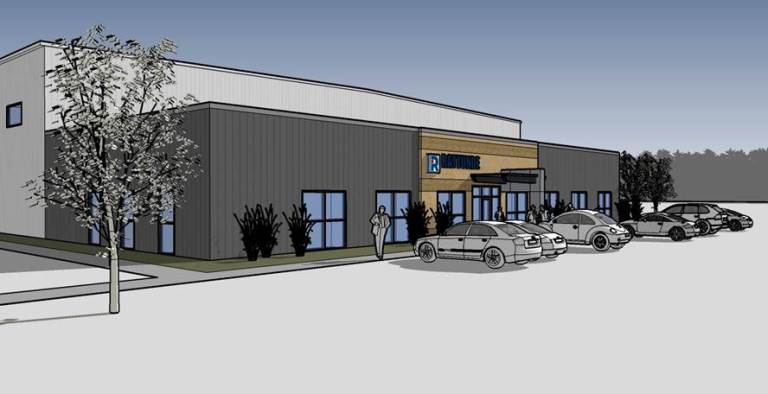
Concurrent with this development, Rattunde has expanded its workforce with technical service and administrative personnel. As Stadler explains, “Whenever a machinery company grows quickly, there’s an ever-present need for more customer service and technical personnel. Of course, new people must be found and trained.” But, Stadler went on to explain that rapid growth also means working smarter. Rather than waiting for a customer to reach out to Rattunde in a time of need, Rattunde is proactively sending technicians to the customer and performing comprehensive machine inspections, identifying and correcting small issues before they become large ones.
In the end, Stadler says, “This new facility will solidify our North American presence in the high-volume tube and solid bar production markets, thus benefiting our current and future customers in many ways. It’s a purpose-built building, with a forward-looking eye on all we will need to build our machines and systems from the ground up.” Rattunde will continue to occupy its current facility until completion of the new facility.
For more information on this development, please contact:
RATTUNDE CORPORATION
4980 Kendrick Street SE
Grand Rapids, Michigan 49512
Phone: 616-940-3340
Fax: 616-940-2771
Web: www.rattunde-corp.com
Email: company@rattunde-corp.com
Attention: Richard Stadler or Alec Banish